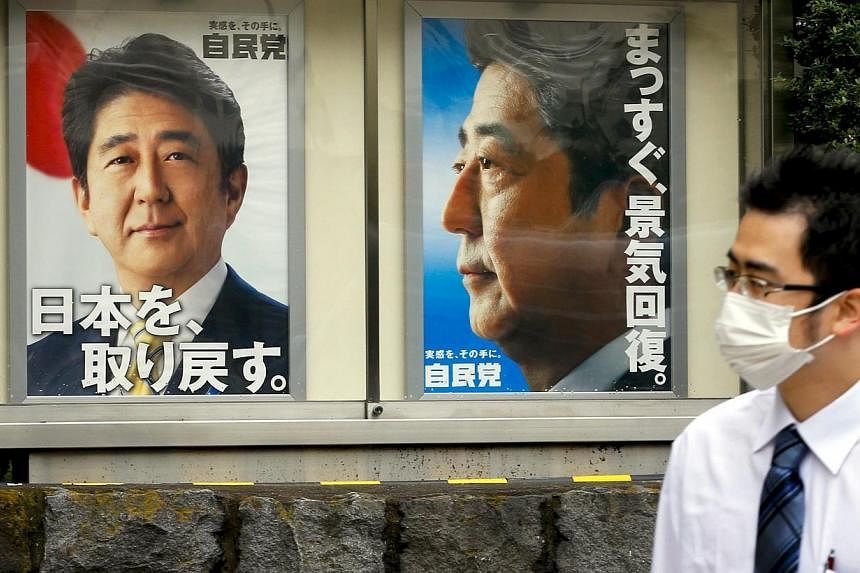TOKYO (AFP) - Japanese Prime Minister Shinzo Abe could call a snap election for next month, two years early, with a plan to boost his support by delaying another scheduled tax hike, reports said on Wednesday.
The first jump in sales tax, which came into effect in April, knocked a tentative revival off course and was blamed for a sharp fall in Japan's second-quarter growth.
Commentators are converging around the idea that Mr Abe will rule out a second rise, from 8 per cent to 10 per cent, and seek a popular mandate that would help him vanquish mumblings of discontent within his own Liberal Democratic Party (LDP) and catch the still-battered opposition unprepared. "Calling a snap election within this year is among my options," Mr Abe told senior party members, the leading business daily Nikkei reported.
The LDP and its junior coalition party Komeito have begun preparations for a vote on either Dec 14 or Dec 21, four other major national papers said. The Tokyo Shimbun said Mr Abe had told Komeito managers the election could be held before the year is out.
Mr Abe has been coy in public, telling reporters in Beijing on Tuesday he had made no decisions, although he admitted to a television interviewer last week: "When asked the question, a prime minister has a set formula: 'I'm not thinking of a snap election'".
Reports of an election come ahead of the release of third-quarter gross domestic product data on Monday, which the government has for a long time said will inform the decision on pressing ahead with the sales tax hike scheduled to take effect in October next year.
The mass-circulation Yomiuri Shimbun was among media saying on Wednesday that the rise would be delayed by 18 months to April 2017.
Last month's surprise inflation of the Bank of Japan's already-huge monetary easing programme, which sent a ripple of excitement through the markets and lit a rocket under stock prices, was also propitious.
The combined effect of this bounce and a feel-good delay in the tax rise would be a boon to Mr Abe if he goes to the voters, and would strengthen his hand for difficult reforms, said Capital Economics in a note.
"A snap election could have the virtue of giving the government a stronger mandate as it struggles to push ahead with structural reform," it said.
"But it would not be a long-term positive if coupled with a delay in the tax hike currently scheduled for October 2015."
Mr Mikitaka Masuyama of the National Graduate Institute for Policy Studies said Mr Abe's calculation was nakedly political.
"A general election at this time is tactically right for ruling bloc lawmakers but may not be right for the management of the government," he said.
"It could slash the number of their seats in the Parliament, but the size of the decrease would be limited at this time."
Public support for the Abe administration is hovering around 50 per cent, the lowest levels since he took power in December 2012, according to three polls conducted last weekend by public broadcaster NHK and two major papers.
More than 70 per cent of voters are against the tax hike, the polls said.

